The defeat of the Russian-Prussian army at Lützen
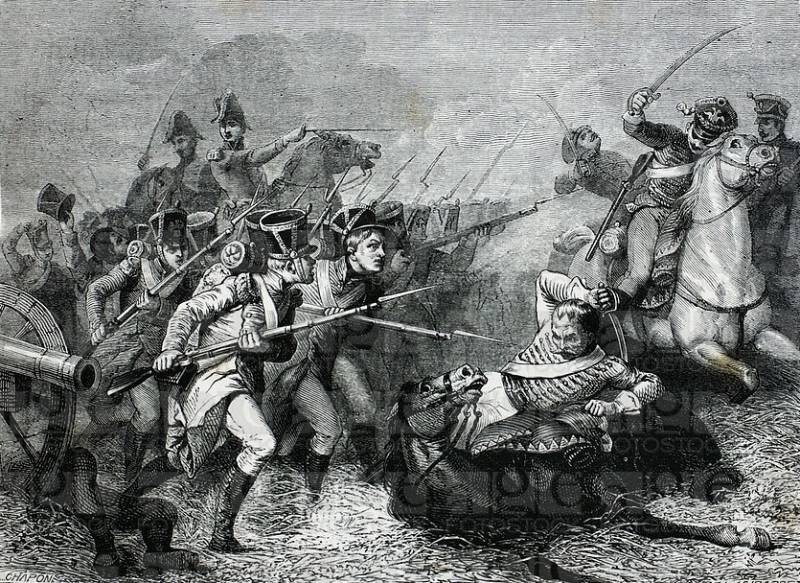
Charles and Paul Girardet. Battle of Weissenfels. The French infantry in a square attacks the Russian cavalry. XNUMXth century drawing
Situation at the front
Having driven the remnants of Napoleon's army from Russia ("Army no longer exists"; "This is the beginning of the end." The beginning of the agony of Napoleon's empire), in December 1812, Russian troops rested. The two-month campaign from Tarutino to Vilna cost the Russian army dearly. Half of the army was lost (mostly sick, frostbitten), out of 620 guns, 200 remained.
A trip abroad was announced for Christmas. On December 28, 1812, Kutuzov's army crossed the Neman on the ice. The war was transferred to the territory of Prussia and the Duchy of Warsaw. The purpose of the winter campaign was to defeat the flank corps of Napoleon (MacDonald in Prussia, the Austro-Saxons in Poland) and to attract Prussia to our side.
The trip ended successfully. In January 1813, all of East Prussia was cleared of the French by Wittgenstein. The troops of the Prussian General York remained neutral, the remnants of the French troops fled. The Prussians enthusiastically welcomed the Russians as liberators from the French occupation. Thorn and Danzig were besieged: Thorn capitulated in April, Danzig in December. The main forces of Kutuzov went to Plock. The Austrian troops of Schwarzenberg, in view of the fact that the Vienna court did not want to fight with Russia in the interests of Napoleon, left Warsaw without a fight. The Austrians and Poles of Poniatowski left for Austrian Galicia. The Saxon 10th corps of Rainier retreated to Kalisz, where he was overtaken and defeated by the 16th flying corps of General Winzingerode. The Saxons lost 3 thousand people and fled.
The question of the continuation of the war
In St. Petersburg, supporters of rapprochement with England (Anglophiles) and a large German party, both the Germans themselves, who found shelter and service in the Russian Empire, and Russian aristocrats who had family ties in Germany, advocated the continuation of the war with Napoleon. They demanded not only to expel the French from Germany, but also to destroy Napoleon's empire in general. Emperor Alexander the First, who had a personal dislike for the "Corsican monster" and dreamed of the glory of the winner of Napoleon, was also a supporter of the continuation of the war.
Although the national interests of Russia were to end the confrontation with France. We did not have fundamental contradictions - London, Vienna and Berlin received all the benefits from such a war. It was enough to deprive the French of a foothold in Poland and East Prussia. Russia benefited from a rather strong France - as a counterweight to Britain, which was creating its own global empire and consistently pursuing an anti-Russian policy, as well as the Austrian Empire and Prussia.
In the active Russian army, it was the foreign officers who insisted on active decisive action against the retreating troops of Napoleon. The British military agent Colonel Wilson, in particular, resented Kutuzov's waiting tactics. He tried to interfere in the affairs of the Russian command. In the end, Kutuzov said that he did not at all consider the need for the complete destruction of the Napoleonic empire to be in the interests of Russia.
- said the Russian field marshal.
And further:
Therefore, Kutuzov began to interfere with London and St. Petersburg, where they were aimed to continue the war. After the Russian army entered the borders of Prussia, in St. Petersburg they began to seek the resignation of the commander in chief. Kutuzov's unexpected death in Bunzlau in April 1813 preceded his official resignation.
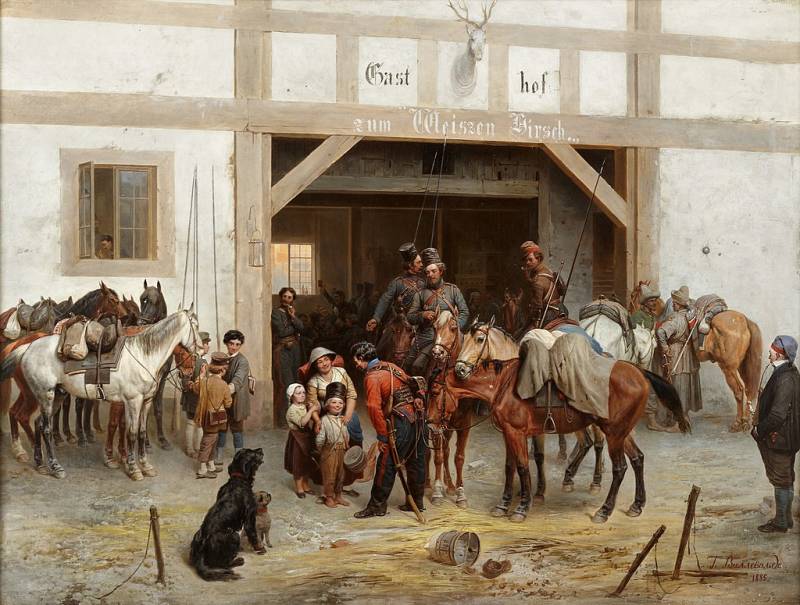
Cossacks in Bautzen, 1813. Painting by Bogdan Villevalde
Rise of Prussia and the 6th Coalition
On December 30, 1812, the Prussian general Yorck and the Russian army general Dibich signed the Taurogen Convention. The Prussian corps of General York was declared neutral and no longer interfered with the operations of the Russian army. This was the beginning of a broad national liberation movement in Prussia. The Prussian kingdom rebelled against the French occupation. Calls were made throughout the country for arms, formed detachments of army partisans following the example of the Russians.
The cowardly Prussian king Friedrich Wilhelm III was not immediately able to abandon the psychology of Napoleon's vassal. At first, he refused to accept the convention signed by York and removed the bold general from command. However, under pressure from the army and society, the Prussian king entered into negotiations with the Russian tsar. On February 16 (28), 1813, an alliance was signed between Russia and Prussia in Kalisz. Russia undertook to put up an army of 150 and restore Prussia within the borders of 1806. Prussia at the first stage put up an 80-strong army. The Prussian army, under the command of the fierce hater of the French, Blucher, was subordinate to the Russian commander in chief.
Thus, the 6th anti-French coalition was created. Its core was Russia and Prussia. England also fought against France and Sweden spoke out. Austria, where the cunning Metternich was in charge of foreign policy, waited to get the most out of the situation.
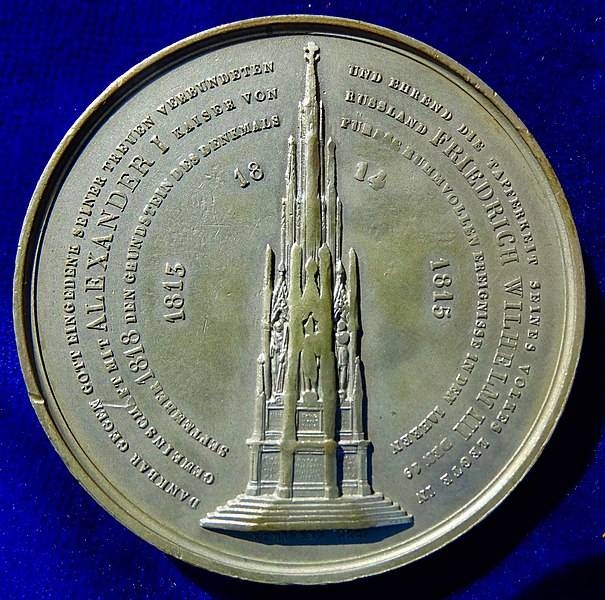
Commemorative medal of 1818, dedicated to the union of Alexander I and Wilhelm III
Allied offensive
By mid-February 1813, the Russian army was restored to 140 thousand bayonets and sabers. To reinforce the active army in the western provinces, a 180-strong reserve army was formed. Kutuzov opposed an immediate decisive offensive for the Elbe, fearing unjustified losses.
But Kutuzov could not openly resist the plans of Emperor Alexander. The Russian army from the Kalisz region entered Saxony and occupied Dresden on March 15 (27). Russian partisan detachments, with the help of Prussian partisans, liberated all of central Germany. On April 3 the Russians were in Leipzig.
To the north, a separate corps of Wittgenstein advanced. The advance detachment from his corps under the command of Adjutant General Chernyshev entered Berlin on March 4, left without a fight by the French garrison. On March 11, the main forces of Wittgenstein triumphantly entered the liberated capital of Prussia. On March 13, Chernyshev's detachment raided Lüneburg and completely destroyed the French division (4,5 thousand soldiers were killed or captured). On March 17, the 20-strong Prussian corps of York joined Wittgenstein's troops (30 thousand) in Berlin. On March 27, 1813, the Prussian king officially declared war on France.
Wittgenstein went to Magdeburg on the Elbe, eliminated the threat of an attack on Berlin, and in the 20th of April moved south to Leipzig to join Kutuzov's army. On April 16 (28) Kutuzov died, Wittgenstein led the army. The position of the new commander-in-chief was not easy. Under his command were more senior commanders - Tsarevich Konstantin Pavlovich, Barclay de Tolly, Blucher. Wittgenstein did not have such authority in the army as Kutuzov. Also, his unity of command and initiative were limited by the presence of Emperor Alexander Pavlovich in the army.
As a result of the successful actions of the Russian army and the Prussian uprising, the territory of Prussia was basically liberated from the enemy. The French hoped to hold the enemy on the line of strong fortresses along the Vistula and Oder until Napoleon approached with a new army. However, this plan failed. Firstly, there were no field corps that could support the besieged fortresses.
Secondly, the Prussians rebelled and actively helped the Russians. Thirdly, the Russian troops did not linger for the siege of fortresses and went forward. For the blockade, limited and secondary forces were assigned, often inferior in number to the garrisons of the fortresses. The Russians actively involved the militia for siege actions, the Prussians used the landwehr for this. Isolated fortresses, having lost the support of the field army and supplies, sooner or later surrendered. This tactic of the allies brought brilliant success, as it deprived the enemy of serious forces and material resources.
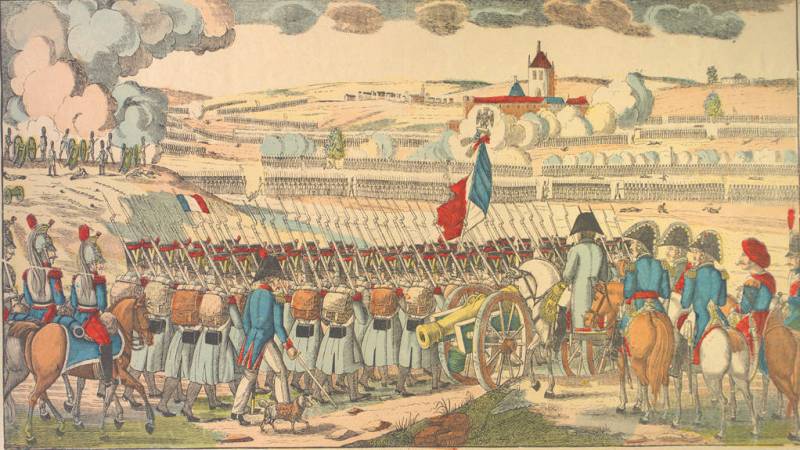
Napoleon sends troops to attack at Lützen. Colorized XNUMXth century engraving
The forces of the parties
With great difficulty, Napoleon scored in the winter of 1812-1813. in France, already bled dry by long wars, a new army. Some of the regiments were transferred from Spain, some were recruited from recruits. The army lacked cavalry and cannons. The brilliant cavalry of the French Empire perished in Russia. France was poor in horses. Stud farms in Poland and northeastern Germany were lost. Austria did not sell horses. Therefore, in a large army there were only 8 thousand cavalrymen.
In April 1813, having up to 200 thousand people with 350 guns, Napoleon invaded Germany. Having little cavalry, Napoleon did not conduct deep reconnaissance. The French did not know that the enemy army was standing near Leipzig and their corps were moving towards the city in echelons. By April 19 (May 1), the French corps (up to 170 soldiers) stretched for 60 miles along the Jena-Naumburg-Merseburg line southwest of Leipzig.
The allied army was located south of Leipzig, trying to reach the borders of Austria. Negotiations on an alliance were underway with the Vienna court. Wittgenstein's army consisted of 54 Russian soldiers with 440 guns and 38 Prussians with 216 guns. The allied cavalry numbered up to 20 thousand cavalry. The allied army occupied an advantageous flank position in relation to the enemy. Wittgenstein decided to take advantage of the division of the enemy forces and smash them piece by piece.
The Prussian General Gneisenau noted:
That is, in a Suvorov way, it was not possible to attack the enemy quickly, decisively and unexpectedly (“like snow on the head”).
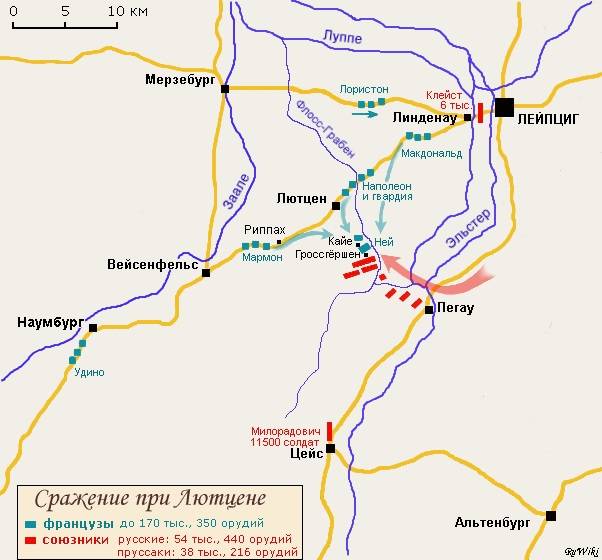
Battle
On April 19 (May 1), 1813, on the road to Leipzig near Weissenfels, the French fought with the Russian advanced detachment from the corps of General Winzingerode. The commander of the Napoleonic guards cavalry, Marshal Bessières, was killed by a random cannonball. Pushing the enemy back, the French occupied Lützen, located on a high road 20 km southwest of Leipzig. In Lützen, the main apartment (headquarters) of Napoleon and the guards were located.
Russian-Prussian troops were supposed to take up positions at night and on the morning of April 20 (May 2) to suddenly strike at the enemy. But the columns got lost, interfered with each other. The Allied first line took up position only a few hours after the scheduled time. The sudden morning attack failed. At 10 o'clock in the morning, the French corps of General Lauriston started a skirmish with the Prussian detachment of Field Marshal Kleist, who occupied Leipzig. The French Guard marched towards Leipzig.
Only around noon did Blucher's Prussian corps attack Ney's corps, which covered the right flank of the French army from the Pregau side. The battle began in the rear of Napoleon, 5 km south of Lützen near the villages of Grossgerschen and Starsiedel. Napoleon reacted quickly and in a timely manner: the corps, including a separate group of Beauharnais, were sent to help Ney. Those troops that were closest to Leipzig made up the left flank of Ney, the rear corps - the right flank.
Before the arrival of the corps of Marmont, Bertrand and Macdonald, only about 50 thousand Frenchmen opposed the allied forces. The inexperienced but brave French soldiers fought furiously. The Prussian infantry, supported by the Russian cavalry, slowly pressed the enemy. The Prussians fought bravely. The chief of staff of the Prussian army, General Scharnhorst, was wounded by a cannonball in the leg (he died in the summer). The place was convenient for defense: rugged terrain with many canals, ponds, villages with stone houses and buildings. This helped the French. The allies were unable to use their numerical advantage at the beginning of the battle, more cavalry and cannons.
By 17 o'clock other French corps began to approach. The French now had a numerical superiority: more than 70 thousand allies and about 100 thousand French took part in the battle itself. The allies went on the defensive. Napoleon skillfully concentrated the fire of 80 guns against the center of the allies in the village of Kaye. The French guards recaptured the positions previously lost by Ney. By nightfall, the French began to cover the flanks of the Russian-Prussian army. In addition, the Loriston corps drove the Prussians out of Leipzig, which created the threat of a deep bypass of the allied army from the north and loss of communication with the Elbe River.
General Wittgenstein asked the permission of the monarchs who were with the army to retreat. The Allies retreated on 3 May. The losses of the allies, according to various estimates, from 12 to 20 thousand people (most of the losses fell on the Prussians - from 8 thousand dead). Losses of the French army 15-20 thousand people. The high losses of Napoleon's army are explained by the presence of a large number of brave, but poorly trained recruits. The Allies also had more guns.
In general, Kutuzov turned out to be right. The Allies were not yet ready for a decisive and successful offensive. Napoleon was head and shoulders above the commanders of Russia and Prussia. The allies were unable to use their advantages and defeat the enemy.
However, Napoleon did not achieve a decisive victory. The Russian-Prussian army was not defeated, it remained combat-ready. Again, the French could not quickly pursue the enemy in order to finish him off because of the small number of cavalry.
The Russians withdrew east to Dresden, the Prussians went north, fearing for the fate of Berlin, then rejoined the Russians. Miloradovich's corps was in the rearguard and successfully held back the enemy. On April 26 (May 8), the Russians left Dresden and crossed the Elbe. Saxony fell back under the rule of Napoleon. The allies took up positions on the eastern outskirts of Saxony at Bautzen, preparing to give a new battle.
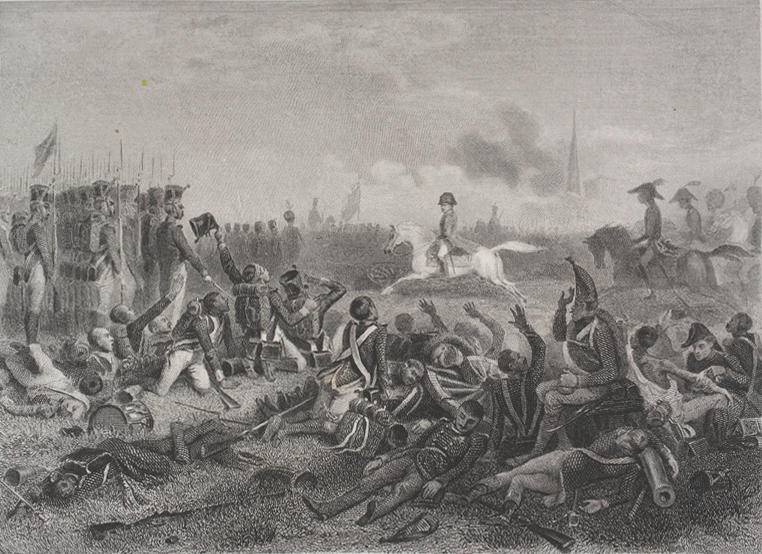
Napoleon on the battlefield at Lützen. XNUMXth century engraving. Auguste Raffet
Information